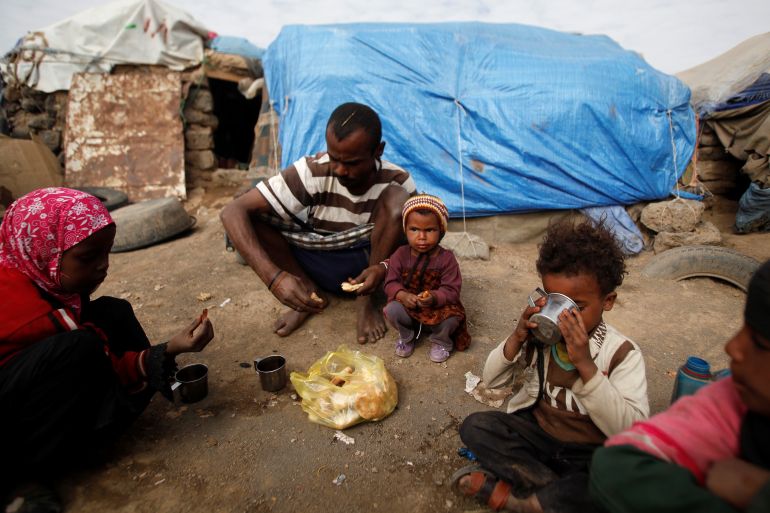Millions ‘one step away’ from famine in Yemen, UN warns
Some five million people are facing imminent famine and disease as the war drags on, the UN says.

Ending Yemen’s ongoing famine is an “overarching humanitarian priority” amid a litany of crises, the UN’s outgoing special envoy for the country said.
Martin Griffiths told the UN Security Council on Monday that roughly two-thirds of the war-ravaged country’s population – about 20 million people – rely on humanitarian aid for their day-to-day needs.
Keep reading
list of 4 itemsIn Pictures: The grim battle for key Yemeni city of Marib
Amid conflict and poverty, Yemen’s hospitals are struggling
In Pictures: Yemen’s forests are next casualty of war
Roughly five million people “are one step away from succumbing to famine and the diseases that go with it”, he warned.
An additional 10 million people “are right behind them”, added Griffiths.
“Famine isn’t just a food problem. It’s a symptom of a much deeper collapse. In many ways, it is all of Yemen’s problems rolled into one, and it demands a comprehensive response,” he said.
Much of the country’s starvation is tied to the extreme depreciation of Yemen’s national currency and the collapse of the economy, with GDP plummeting 40 percent since 2015 when Iran-backed Houthi rebels seized control of the country.
The Yemeni riyal, meanwhile, is trading at record lows to the US dollar.
Khaled Mohamed Khiari, assistant UN secretary-general for the Middle East, raised further alarm over widespread fuel shortages that are worsening in Houthi-controlled territories.
Only three ships carrying oil supplies were allowed to dock at Yemen’s strategic port city of Hodeidah since July, while four others remain in a holding area controlled by the Saudi Arabia-led, anti-Houthi coalition, Khiari said.
The port of Hodeidah – which has remained largely shut over the years – is Yemen’s main port and a major lifeline for humanitarian supplies entering the country, which the UN has described as “the world’s worst humanitarian disaster”.
‘Prioritise civilian needs’
All but one Yemen Petroleum station in Houthi-controlled territories have closed because of the shortages, and waiting times to refill gas canisters used for cooking have reached one month, according to the UN.
“We reiterate our call on the government of Yemen to urgently allow the entry of all essential commercial supplies, including fuel ships to Hodeidah without delay,” said Khiari.
“All parties must prioritise civilian needs and abstain from weaponising the economy, particularly in light of the critical humanitarian situation in the country.”
In March, Saudi Arabia offered a nationwide ceasefire in Yemen, but the Houthis rejected the proposal, calling for a complete end to the Saudi-led blockade on the country’s ports and Sanaa airport first.
Saudi Arabia says the Houthis are proxies of its regional rival, Iran. But the rebels deny receiving material support from Tehran.
Meanwhile, Griffith called for an end to “profiteering” and the implementation of a definitive ceasefire, which would give “desperate civilians a break and create the space needed to address the drivers of the crisis”.
Yemen has been beset by violence and chaos since 2014 when Houthi rebels overran much of the country.
The conflict intensified in 2015 when Saudi Arabia and its regional allies launched a military campaign against the Houthis, who had taken over the capital Sanaa and expelled the Riyadh-backed government of Yemeni President Abd-Rabbu Mansour Hadi.
The violence spurred an enormous humanitarian crisis that has killed at least 233,000 people, according to UN estimates, and left millions on the verge of starvation.